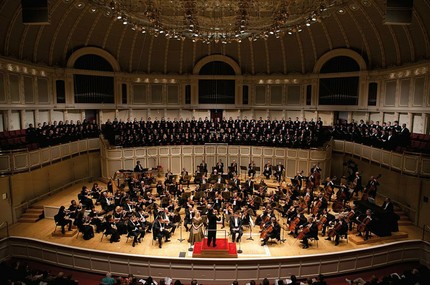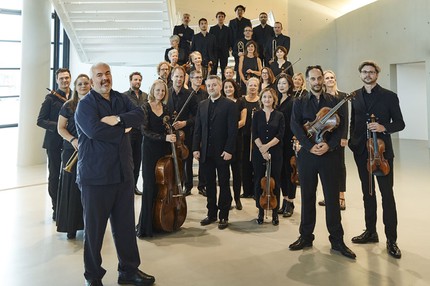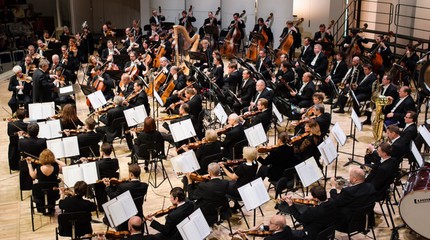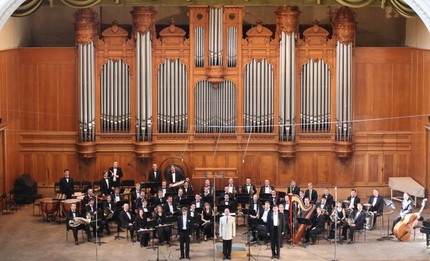
Chicago Symphony Orchestra |
Chicago Symphony Orchestra

The Chicago Symphony Orchestra is recognized as one of the leading orchestras of our time. The performances of the CSO are in great demand not only in his native country, but also in the music capitals of the world. In September 2010, the renowned Italian conductor Riccardo Muti became the tenth music director of the CSO. His vision for the orchestra’s role: deepening interaction with the Chicago audience, supporting a new generation of musicians, and collaborating with leading artists are all signs of a new era for the band. The French composer and conductor Pierre Boulez, whose longstanding relationship with the CSO contributed to his appointment as Principal Guest Conductor in 1995, was named Honorary Conductor of the Helen Rubinstein Foundation in 2006.
In collaboration with world-renowned conductors and guest artists, the CSO performs over 150 concerts a year at the Chicago Center, the Symphony Center, and each summer at the Ravinia Festival on Chicago’s North Shore. Through its dedicated curriculum, “The Institute for Learning, Access, and Training,” the CSO attracts over 200.000 local residents of the Chicago area each year. Three successful media initiatives were launched in 2007: CSO-Resound (an orchestral label for CD releases and digital downloads), national broadcasts with new weekly broadcasts of their own production, and the expansion of the CSO’s presence on the Internet – free download of orchestra videos and innovative presentations.
In January 2010, Yo-Yo Ma became the first creative consultant for the Judson & Joyce Green Foundation, appointed by Riccardo Muti for a three-year term. In this role, he is an invaluable partner to Maestro Muti, the CSO administration and musicians, and through his unparalleled artistry and unique ability to connect with others, Yo-Yo Ma, along with Muti, has become a true inspiration to the Chicago audience, speaking out for the transformative power of music. Yo-Yo Ma will be involved in the development and implementation of new initiatives, projects and music series under the auspices of The Institute for Learning, Access, and Training.
The two new composers began a two-year collaboration with the orchestra in autumn 2010. Mason Bates and Anna Kline have been appointed by Riccardo Muti to curate the MusicNOW Concert Series. Through collaborations with artists from other fields and institutions, Bates and Kline strive to break through the traditional barriers of Chicago society by bringing fresh ideas to partnerships and creating unique musical experiences. In addition to the MusicNOW series, for which each composer wrote a new piece (premiering in the spring of 2011), CSO performed works by Kline and Bates in the subscription concerts of the 2010/11 season.
Since 1916, sound recording has become a significant part of the orchestra’s activities. Releases on the CSO-Resound label include Verdi’s Requiem directed by Riccardo Muti and featuring the Chicago Symphony Choir, Rich Strauss’s A Hero’s Life and Webern’s In the Summer Wind, Bruckner’s Seventh Symphony, Shostakovich’s Fourth Symphony, First, Second, Mahler’s Third and Sixth Symphonies – all under the direction of Bernard Haitink, Poulenc’s Gloria (featuring soprano Jessica Rivera), Ravel’s Daphnis and Chloe with the Chicago Symphony Choir under B. Haitink, Stravinsky’s Pulcinella, Four Etudes and Symphony in three movements Pierre Boulez, “Traditions and Transformations”: Sounds of Chicago’s Silk Road, featuring the Silk Road Ensemble, Yo-Yo Ma and Wu Man; and, for download only, a recording of Shostakovich’s Fifth Symphony conducted by Moon Wun Chung.
CSO is the recipient of 62 Grammy Awards from the National Academy of Recording Arts and Sciences. The recording of Shostakovich’s Fourth Symphony with Haitink, which includes a DVD presentation of “Beyond the Score”, won the 2008 Grammy for “Best Orchestral Performance”. That same year, Traditions and Transformations: Sounds of the Silk Road won a Grammy for Best Classical Album Mixing. Most recently, in 2011, a recording of Verdi’s Requiem with Riccardo Muti was awarded two Grammys: for “Best Classical Album” and for “Best Choral Performance”.
CSO has been producing its own weekly broadcast since April 2007, which is broadcast on the nationwide WFMT radio network, as well as online on the orchestra’s website – www.cso.org. These broadcasts offer a new, distinct approach to the classical music radio program – lively and engaging content designed to provide deeper insight and offer further connections to the music played in the orchestra’s concert season.
The history of the Chicago Symphony began in 1891 when Theodore Thomas, America’s leading conductor and acknowledged “pioneer” in music, was invited by Chicago businessman Charles Norman Fey to establish a symphony orchestra here. Thomas’s goal – to create a permanent orchestra with the highest performing capabilities – was already achieved in the first concerts in October of that year. Thomas served as music director until his death in 1905. He died three weeks after donating the hall, the permanent home of the Chicago Orchestra, to the community.
Thomas’ successor, Frederick Stock, who began his career as viola in 1895, became assistant conductor four years later. His stay at the helm of the orchestra lasted 37 years, from 1905 to 1942 – the longest period of all ten leaders of the team. Stock’s dynamic and pioneering years in 1919 made possible the founding of the Civic Orchestra of Chicago, the first training orchestra in the United States that was affiliated with a major symphony. Stock also worked actively with young people, organizing the first subscription concerts for children and starting a series of popular concerts.
Three eminent conductors led the orchestra over the next decade: Désiré Defoe from 1943 to 1947, Artur Rodzinsky took office in 1947/48, and Rafael Kubelik led the orchestra for three seasons from 1950 to 1953.
The next ten years belonged to Fritz Reiner, whose recordings with the Chicago Symphony Orchestra are still considered standard. It was Reiner who, in 1957, invited Margaret Hillis to organize the Chicago Symphony Choir. For five seasons – from 1963 to 1968 – Jean Martinon held the position of music director.
Sir Georg Solti is the eighth musical director of the orchestra (1969-1991). He held the title of Honorary Music Director and worked with the orchestra for several weeks each season until his death in September 1997. Solti’s arrival in Chicago marked the beginning of one of the most successful musical partnerships of our time. The first foreign tour of the CSO took place in 1971 under his leadership, and subsequent tours in Europe, as well as trips to Japan and Australia, strengthened the reputation of the orchestra as one of the best musical groups in the world.
Daniel Barenboim was appointed music director in September 1991, a position he held until June 2006. His musical direction was marked by the opening of the Chicago New Music Center in 1997, opera productions in the orchestra hall, numerous virtuosic performances with the orchestra in the double role of pianist and conductor, 21 international tours took place under his leadership (including the first trip to South America) and composer’s series of subscription concerts appeared.
Pierre Boulez, who is now honorary conductor, is one of only three musicians to hold the title of Principal Guest Conductor of the orchestra. Carlo Maria Giulini, who began performing regularly in Chicago in the late 1950s, was appointed Principal Guest Conductor in 1969, where he remained until 1972. Claudio Abbado served from 1982 to 1985. From 2006 to 2010, the eminent Dutch conductor Bernhard Haitink served as chief conductor, launching the CSO-Resound project and taking part in several triumphant international tours.
The Chicago Symphony Orchestra has long been associated with Ravinia in Highland Park, Illinois, having first performed there in November 1905. The orchestra helped open the first season of the Ravinia Festival in August 1936 and has performed there continuously every summer since then.
Music directors and chief conductors:
Theodore Thomas (1891-1905) Frederic Stock (1905-1942) Desiree Dafoe (1943-1947) Artur Rodzynski (1947—1948) Rafael Kubelik (1950-1953) Fritz Reiner (1953-1963) Jean Martinon (1963-1968) Irwin Hoffman (1968—1969) Georg Solti (1969-1991) Daniel Barenboim (1991-2006) Bernard Haitink (2006-2010) Riccardo Muti (since 2010)





